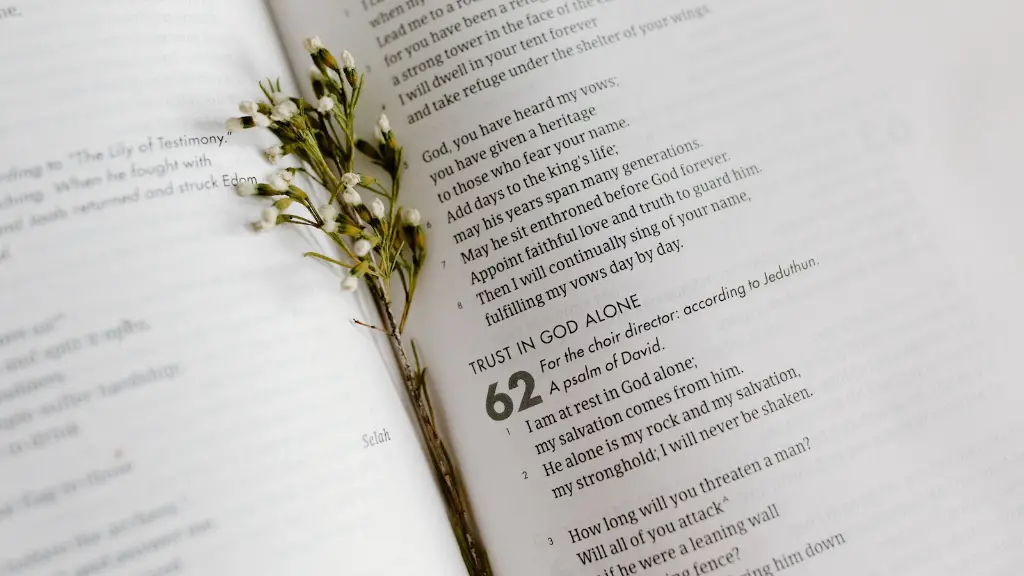Does The Bible Mention The Rapture?
Christian believers have long been fascinated by the concept of the Rapture – a time of great tribulation during which faithful believers will be taken up into Heaven to be with God. One of the main questions surrounding the Rapture is whether or not it is actually mentioned in the Bible. It is widely believed that the Bible does in fact mention the Rapture, and this article will explore this question in more detail.
The term “Rapture” is not specifically mentioned in the Bible, but many passages are widely accepted as referring to the Rapture. The most notable of these is 1 Thessalonians 4:16-17, which reads: “For the Lord himself will come down from heaven, with a loud command, with the voice of the archangel and with the trumpet call of God, and the dead in Christ will rise first. After that, we who are still alive and are left will be caught up together with them in the clouds to meet the Lord in the air. And so we will be with the Lord forever.”
In addition to this passage, other New Testament passages seem to refer to the concept of the Rapture, including Mark 13:24-27, and John 14:1-3. It is also worth noting that many Old Testament passages refer to a time of judgement, in which the wicked will be punished and the righteous will be saved. Moreover, the book of Revelation outlines a period in which the Earth and the heavens will be judged. Taken together, these scriptures suggest that the concept of the Rapture is found within the Bible.
It is also worth noting that there is some debate among theologians and scholars as to the exact meaning of some of the passages that are believed to refer to the Rapture. Some maintain that the passages refer to a physical “rapture”, in which believers will be taken up into Heaven, while others argue that the passages simply refer to an imminent judgement, rather than an actual rapture event. This debate is likely to continue for some time, as it is an extremely complex theological question.
In conclusion, it appears that the Bible does indeed refer to the concept of the Rapture, although there is some debate as to the precise meaning of some of the passages. Ultimately, the interpretation of these passages must be left up to individual believers, who must prayerfully decide for themselves what it means for them and for their faith.
Divisions in Beliefs on The Rapture
Although many Christians believe in the Rapture, there are considerable divisions in belief over the precise nature of the event. Some believe that the Rapture will take place before the tribulation period, while other believe that it will take place after the tribulation. Some consider it a literal event that may happen soon, while others believe it is purely symbolic and will not occur in the near future. This range of beliefs is reflective of the fact that there is not a single accepted interpretation of the passages thought to refer to the Rapture.
In order to decide which interpretation is correct, it is important to look at the various interpretations of the passages in question. One of the most interesting interpretations of the Rapture is the post-tribulation view. This view holds that the Rapture will take place after the tribulation period, and will be preceded by the return of Jesus. This view is based largely on passages such as Matthew 24:25-31, which speak of Jesus’ return
The pre-tribulation view, on the other hand, holds that the Rapture will take place as a separate event before the tribulation period. This view is based largely on passages such as 1 Thessalonians 4:16-17 and Revelation 3:10, which seem to indicate that a period of rapture or “catching up” will occur before the period of tribulation. Ultimately, the interpretation of these passages is largely a matter of personal faith.
It is also important to note that there are other interpretations of the Rapture, such as the mid-tribulation view and the partial-rapture view. These views, while less popular than the pre-tribulation and post-tribulation views, should not be disregarded. Each view has its own merits and its own flaws, and it is ultimately up to each individual believer to decide which interpretation is correct.
The Eschatological View of The Rapture
The concept of the Rapture has its roots in eschatology – the study of the end of the world. Eschatology is a complex and often divisive subject, but it is one that is of great importance to many Christians. Basically, eschatology attempts to answer the question: “What will happen at the end of the world?” As such, it is inextricably linked to the Rapture, as the event is widely believed to be part of the end-times narrative.
Eschatology is divided into two branches: pre-millennial and post-millennial. Pre-millennialism holds that Jesus will return to the Earth before the thousand-year reign of peace. Post-millennialism holds that Jesus will return after the thousand-year reign of peace. In either case, the Rapture is seen as an integral part of the end-times narrative. It is worth noting, however, that the exact details of the Rapture remain unclear.
It is also worth noting that there is no consensus among scholars as to which eschatological view is correct. Some scholars argue that pre-millennialism is correct, while others argue that post-millennialism is correct. Ultimately, the decision is a matter of personal faith, and individual believers must prayerfully decide which view is correct for them.
The Timing of The Rapture
Although there is considerable debate as to the exact timing of the Rapture, most Christians agree that it will occur sometime in the near future. Many interpret passages such as Mark 13:24-27 and Revelation 3:10 to mean that the Rapture will occur before the tribulation period, while others believe that it will occur after the tribulation period. In either case, it is generally believed that the Rapture will take place sometime in the near future.
The exact timing of the Rapture is not known, however, and there is considerable debate among theologians as to whether it will happen suddenly or gradually. Some maintain that it will be a sudden event that will surprise many, while others argue that it will be a gradual event that will be preceded by a period of preparation and warning. Ultimately, deciding which interpretation is correct is a matter of personal faith.
In addition to this debate, there is also some controversy surrounding the exact date of the Rapture. Some believe that the Rapture will take place on a particular date, while others dispute this notion. It is important to note, however, that attempting to pinpoint the exact date of the Rapture is largely a fruitless endeavor, as the scriptures do not offer any definitive answers on this point.
The Impact of The Rapture On Christianity
The concept of the Rapture is one that has had a great impact on Christianity. It has been a source of controversy from the very beginning, with some viewing it as a literal event and others viewing it as a metaphor. It has also been influential in the development of end-times theology, and is widely accepted as an important part of Christian belief.
In addition to this, the Rapture has also had an influence on the culture of the church. It has led to the formation of churches and denominations focused on end-times theology, and it has sparked a great deal of interest in eschatology. The Rapture has even been featured in popular culture, most notably in the Left Behind series of novels and movies. As such, it is clear that the concept of the Rapture has had a great impact on Christianity.
Ultimately, the Rapture is an intriguing and intriguing concept that has been a source of debate and discussion within Christianity for centuries. It remains to be seen what the future holds for this controversial doctrine, but one thing is certain: the Rapture is certain to remain an important part of Christian belief for the foreseeable future.
Interpretations of The Rapture
There are a variety of interpretations of the Rapture within Christianity. As previously discussed, some maintain that the Rapture will take place before the tribulation period, while others argue that it will take place after the tribulation. Other interpretations include the pre-wrath view, the partial-rapture view, and the mid-tribulation view. Ultimately, the interpretation of the Rapture is a matter of personal faith.
In addition to the varying interpretations of the Rapture, there is also a great deal of debate surrounding the event itself. Some maintain that it will involve a literal “catching away” of believers, while others view it as a metaphor or symbol. There is also debate as to whether the Rapture will be visible or invisible, and as to how believers will be “caught up.” It is important to note, however, that no one interpretation is definitively correct.
Finally, it is also worth noting that there are some who believe that the Rapture has already occurred, while others believe that it will occur in the future. This is largely a matter of personal faith, and individual believers must decide for themselves which interpretation is correct. Regardless of which interpretation is correct, however, it is clear that the concept of the Rapture has had an immense impact on Christianity.
The Millennial Reign in Islam
Although the concept of the Rapture is largely associated with Christianity, it is also found in Islam. According to Islamic belief, a period of peace and justice known as the “Millennial Reign” will begin after Jesus returns and rules for a period of forty years. The period of Jesus’ reign is seen by many Muslims as analogous to the Christian concept of the Rapture.
Basically, in Islamic eschatology, Jesus is believed to return before the Day of Judgment. After his return, he will establish a period of peace and justice in which all believers will live in harmony. During this period, the Earth will be filled with justice and the knowledge of God, and peace and harmony will reign. This is seen as analogous to the Christian concept of the Rapture, although there are some important differences between the two beliefs.
It is also important to note that, while some Muslims see a connection between the Islamic and Christian concepts of the millennial reign and the Rapture, there are others who do not. Ultimately, this is a matter of personal belief, and individual Muslims must decide for themselves whether or not they believe there is a connection between the two concepts.
In conclusion, it is clear that the concept of the Rapture is found within the Bible, although there is some debate as to the precise meaning of some of the passages. It is also found in Islamic eschatology, although there are some important differences between the two beliefs. Ultimately, it is a matter of personal faith, and individual believers must decide for themselves which interpretation of the Rapture is correct





